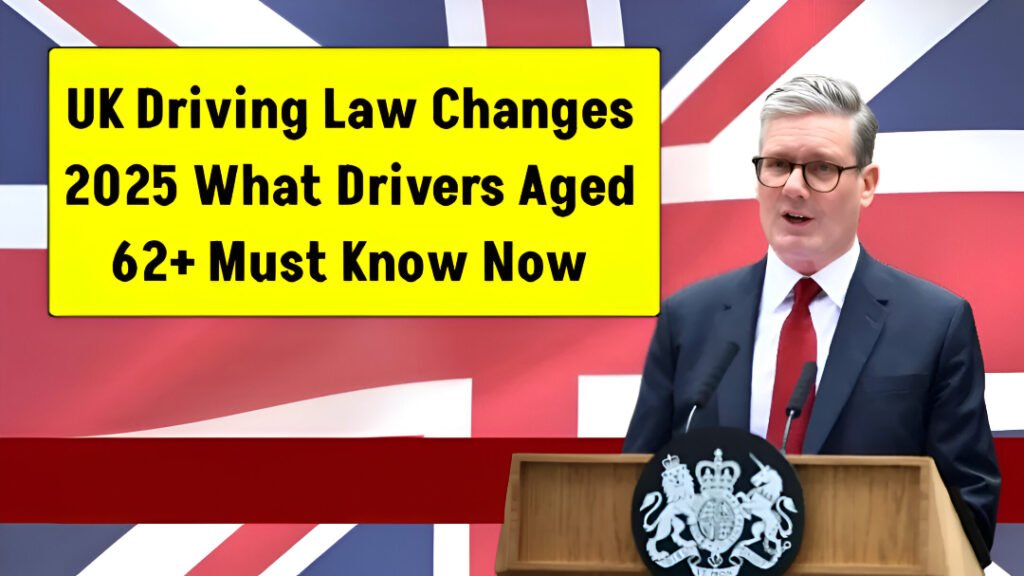UK Driving Law Changes 2025: Driving laws in the UK are undergoing major updates in 2025, and drivers aged 62 and above need to be aware of these changes. The new rules focus on licence renewal, medical and eyesight checks, insurance, digital licences, electric vehicles, parking laws, and road safety enforcement. Understanding these updates is essential for older drivers who want to remain safe, compliant, and independent on the road.
Licence Renewal Rules for Drivers Aged 62+
From 2025, senior drivers will need to confirm their health and driving ability more regularly during licence renewal. The DVLA has introduced a streamlined digital process to make it easier for drivers aged 62 and above to keep their documents updated and ensure that all medical conditions are declared.
Medical and Eyesight Checks for Older Drivers
The new UK driving law changes 2025 introduce stricter medical and eyesight requirements for senior drivers. Anyone over 62 will need to self-certify their fitness and provide evidence of an eyesight test at each renewal. Conditions such as diabetes, heart problems, or vision issues must be reported to maintain road safety.
Car Insurance Impact for Drivers Aged 62+
Insurance companies are aligning policies with the new laws, meaning older drivers may need to provide medical or eyesight proof for cover. At the same time, insurers are offering discounts to seniors who complete refresher courses, helping responsible drivers aged 62+ reduce costs while staying compliant.
Digital Driving Licence in 2025
The UK is rolling out digital driving licences alongside physical cards. For drivers over 62, this will provide extra convenience when travelling or hiring cars, though it may also require getting comfortable with government apps and online verification systems.
Mobile Phone and Speed Enforcement Rules
Mobile phone usage laws are now stricter, with penalties for even brief handheld use. At the same time, new smart cameras will automatically catch speeding, tailgating, and lane violations. Drivers aged 62+ must adapt to this technology-driven enforcement to avoid fines and points.
Parking and Clean Air Zone Regulations
Parking laws in 2025 will involve automated enforcement through cameras, particularly in disabled bays and congestion zones. Clean Air Zones are expanding, with higher charges for petrol and diesel cars. Seniors aged 62+ may need to update Blue Badge permits or consider switching to an EV to save costs.
Electric Vehicles and Older Drivers
The transition to electric vehicles is central to the UK driving law changes 2025. Grants and incentives are being extended to older drivers, and more accessible charging stations are being built. Seniors who adapt to EV driving will not only meet legal requirements but also save on Clean Air Zone fees.
Advanced Driver Assistance Systems (ADAS)
Modern cars increasingly include ADAS features such as lane keeping and automatic braking. In 2025, laws require drivers to understand how these systems work. For drivers aged 62+, learning to use ADAS can make driving safer and reduce risks of accidents caused by delayed reactions.
Penalties and Compliance for Senior Drivers
Failing to comply with the new driving rules can result in fines, licence suspensions, or higher insurance premiums. For drivers aged 62+, ensuring compliance with eyesight tests, medical checks, and parking regulations is essential to avoid costly penalties.
Government Support for Older Drivers
To support drivers aged 62+, the government is offering free training courses, medical subsidies, and online resources. These initiatives aim to make it easier for seniors to adapt to new rules and continue driving safely for longer without feeling forced to give up their independence.
Conclusion
The UK driving law changes 2025 mark an important shift for drivers aged 62 and above. With updates on licence renewal, medical and eyesight checks, digital licences, EV adoption, and stricter enforcement, seniors must stay informed to remain safe and independent on the road. By embracing these changes, older drivers can protect their freedom, save money, and drive confidently in the years ahead.
